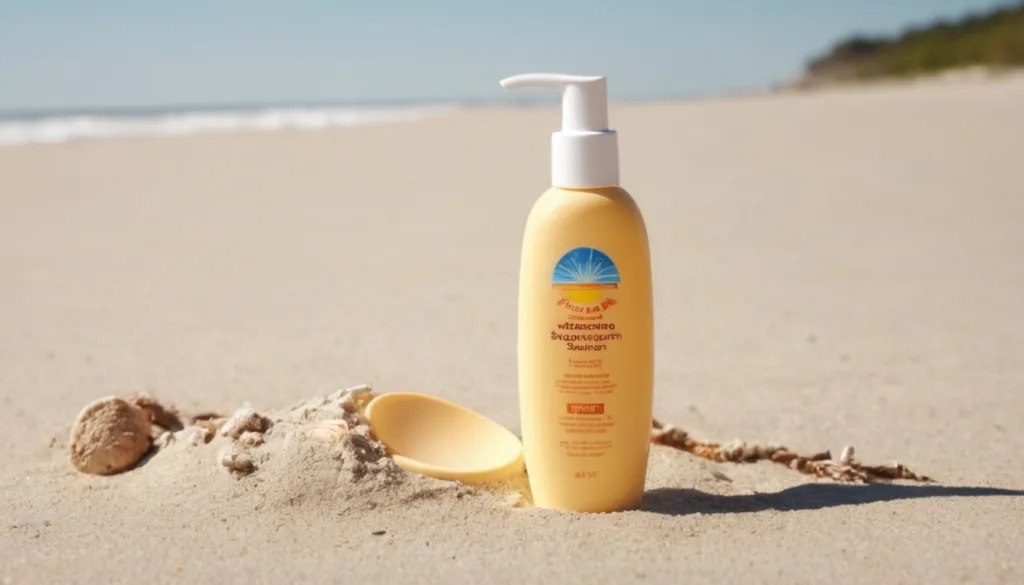You’re on a mission in the drugstore jungle, navigating aisles filled with promises of beauty miracles and skincare dreams. Suddenly, you spot it, standing tall among the sea of products: sunscreen! That’s me whenever I see people raving about a new sunblock on the market. With a grin, I snatch it up, feeling like a savvy shopper ready to conquer the world (or at least the day).
So today, let’s chat about sunscreen, okay? You know, that stuff we slather on to keep our skin safe from the sun’s rays? Well, it’s super important! See, sunscreen is like a shield for your skin, helping to block out those harmful UV rays that can cause all sorts of trouble, like sunburns and even skin cancer. Pretty cool, right?
Now, here’s the thing: Some folks think that using sunscreen might actually make their skin feel dry. Crazy, huh? But don’t worry, we’re going to dive into that and find out what’s what.
In this article, we’re going to break it all down for you. We’ll talk about why sunscreen for dry skin is so crucial, explore why some folks think it dries them out, and give you some handy tips to keep your skin feeling happy and hydrated. So, stick around! We’ve got some good stuff coming your way.
Table of Contents
Let’s Talk Sunscreen Basics

Okay, let’s get to know sunscreen a little better! It’s not just a lotion you slap on before hitting the beach, you know? It’s actually pretty cool stuff!
What’s the Deal with Sunscreen Anyway?
So, sunscreen shields your skin from the sun’s harmful rays. It’s like putting up an umbrella to keep yourself from getting soaked in the sun’s UV radiation.
And guess what? Sunscreen works its magic in different ways!
- Absorption: So, chemical sunscreens are like UV rays’ best friends-turned-double agents. They contain organic compounds such as oxybenzone, avobenzone, octinoxate, and octisalate that absorb those pesky rays and then, like a smooth operator, convert them into harmless heat that your skin releases.
- Reflection: Think of physical sunscreen or mineral sunscreens as the bodyguards of skincare. With ingredients like zinc oxide and titanium dioxide (we’ll get to them later), they stand tall on your skin’s surface, reflecting UV rays away like a boss, preventing them from penetrating and causing damage.
- Scattering: Last but not least, it’s like your skin has its own little UV ray dodgeball game going on. Physical sunscreens scatter those rays away, ensuring they don’t even get close enough to cause trouble. This scattering effect helps to minimize the amount of UV radiation that reaches the skin.
So, whether your sunscreen is absorbing, reflecting, or scattering, the primary mechanisms by which sunscreen protects your skin from the sun’s harmful UV rays, and different sunscreen formulations may utilize one or both of these methods to provide broad-spectrum protection.
Want to geek out on sun protection with me? I’ve got a whole article dedicated to zinc oxide sunscreen. Definitely worth checking out!
Getting to Know Your Sunscreen: The Lowdown on Types and Ingredients
Well, it depends on the type of sunscreen you’re using. There are two main types: chemical and physical.
- Chemical sunscreens: These guys absorb the sun’s rays, kind of like a sponge soaking up water. They’re like little defenders, absorbing the UV rays before they can cause any damage to your skin.
- Physical sunscreens: These ones are more like bodyguards. They sit on top of your skin and reflect those UV rays away, so they never even touch your precious skin.
Now, let’s talk ingredients!
Ingredients in Sunscreen
Ever wonder what’s in that goop you’re slathering on your skin? Well, there are a few key players:
- Zinc oxide: This one’s a superstar! It forms a protective barrier on your skin, shielding you from UV rays like a boss. And hey, for those with dry skin, non-nano zinc oxide sunscreens might be your go-to. They often have larger particles that are less likely to irritate your skin and can even come in moisturizing formulations to give your skin some extra love.
- Titanium dioxide: Another heavy-hitter! It works hand in hand with zinc oxide to keep your skin safe and sound from harmful UV rays. But here’s the good part: titanium dioxide is also known for its gentle properties, making it suitable for sensitive skin types, including dry skin. While titanium dioxide is non-comedogenic and can provide a mattifying effect for those with dry skin, it’s essential to balance its use with moisturizing ingredients. However, keep in mind that it may have the potential to exacerbate dryness in some individuals, so it’s crucial to choose a sunscreen that addresses both sun protection and hydration needs.
Quick Tip: Look for sunscreens with ingredients like aloe vera, coconut oil, hyaluronic acid or glycerine if you’re on the hunt for sunscreen for dry skin. These can help soothe and moisturize your skin while keeping it protected from the sun.
Remember, finding the right sunscreen for your skin is key, especially if you’re dealing with dryness. So, don’t be afraid to experiment a bit and see what works best for you!
if you’re on a quest to find the perfect moisturizer for your dry skin, check out my latest post where I spill all the secrets on choosing the best moisturizer for your skin.
Dry Skin: What’s the Fuss About?

Next up on our agenda, we’ve got dry skin and of course how we can make sunscreen for dry skin work! It’s something a lot of us deal with, and trust me, I’ve been there too. Here’s the lowdown:
Dry Skin 101: What You Need to Know
So, what’s the deal with dry skin anyway? Well, here’s the scoop: Dry skin happens when your skin doesn’t have enough moisture, leaving it feeling tight, itchy, and sometimes even flaky. It’s like your skin is thirsty and needs a big gulp of water!
Signs Your Skin Might Be Thirsty for Some TLC
How do you know if your skin’s feeling dry? Here are a few signs to look out for:
- It feels tight, especially after washing your face or taking a shower.
- You notice flakiness or rough patches on your skin.
- It looks dull or lacklustre like it’s lost its glow.
Quick Tip: If you’re dealing with dry skin, don’t skip the moisturizer! Look for ones with hydrating ingredients like hyaluronic acid or shea butter to give your skin the moisture it craves. And hey, don’t forget the specifically look for sunscreen for dry skin when you’re out on the sun block hunt!
So, Can Sunscreen Cause Dry Skin?
Now, let’s tackle this burning question: Can sunscreen actually dry out your skin? I know it sounds kind of crazy, but let’s get to the bottom of it!
Separating Fact from Fiction: Debunking the Myths About Sunscreen For Dry Skin
First off, let’s bust some myths, shall we? Some folks think that slathering on sunscreen might leave their skin feeling drier than the Atacama. But here’s the truth: It’s not that simple!
- Myth: Sunscreen sucks all the moisture out of your skin, leaving it dry and unhappy.
- Fact: While it’s true that some sunscreens can feel a bit drying, it’s not necessarily the sunscreen itself that’s to blame. Other factors, like the ingredients in the sunscreen or how you apply it, could be causing the dryness.
- Myth: All sunscreens will leave your skin feeling parched.
- Fact: Not all sunscreens are created equal! Some formulas are specifically designed with moisturizing ingredients to keep your skin happy and hydrated, even under the sun’s rays.
- Myth: Skipping sunscreen is the best way to avoid dry skin.
- Fact: Sunscreen is actually crucial for protecting your skin from harmful UV rays, which can contribute to dryness and other skin issues. So, skipping sunscreen altogether isn’t the solution!
What Science Has to Say About Sunscreen For Dry Skin
Alright, let’s get nerdy and dive into the research! Scientists have been busy studying the relationship between sunscreen and dry skin, and here’s what they’ve found:
Research suggests that some ingredients commonly found in sunscreen, like alcohol or certain fragrances, can indeed be drying for the skin. These ingredients may strip away natural oils and moisture, leaving your skin feeling parched and irritated.
However, here’s the silver lining: Not all sunscreens are skin villains! There’s a whole array of options out there, including specially formulated sunscreen for dry skin. These sunscreens are like a double whammy of protection and hydration. They often contain moisturizing ingredients like hyaluronic acid or glycerin, which help to replenish and lock in moisture, leaving your skin feeling happy and hydrated, even after a day in the sun.
So, while it’s essential to be mindful of the ingredients in your sunscreen, rest assured that there are plenty of options available to keep your skin protected and moisturized.
Quick Tip: Before applying sunscreen, make sure your skin is well-hydrated by using a gentle cleanser and applying a moisturizer. This ensures that your skin is prepped and ready to receive the benefits of sunscreen without feeling dry or tight.
Wondering how to avoid the pitfalls of harsh cleansers? Check out my recommendations in another article focusing on skincare solutions for dry skin.
Tips to Keep Your Skin Happy and Hydrated

Now let’s zoom in on keeping your skin happy and hydrated, especially when it comes to using sunscreen! I’ve got some tips to share with you that’ll help you rock that sun protection without any dry spells.
Sunscreen Without the Dry Spell: How to Make It Work
You might be wondering, “Can sunscreen cause dry skin?” Well, here’s the 411: while some sunscreens can leave your skin feeling a bit parched, there are ways to make it work without sacrificing hydration!
- Choose the Right Sunscreen: Look for sunscreens labelled as “for dry skin” or containing moisturizing ingredients like hyaluronic acid, shea butter, or ceramides. These formulas are specially designed to keep your skin hydrated while providing broad-spectrum sun protection against UVA and UVB rays.
- Layer Up: Before applying sunscreen, make sure to moisturize your skin with a lightweight, hydrating moisturizer. Go for products containing humectants like glycerine or hyaluronic acid, which attract moisture to the skin and prevent water loss. This creates a barrier between your skin and the sunscreen, preventing moisture loss and keeping your skin feeling soft and supple.
- Reapply Regularly: Don’t forget to reapply sunscreen every couple of hours, especially if you’re spending time outdoors or swimming. Choose a water-resistant formula to ensure long-lasting protection without drying out your skin. Remember, sweating and water activities can cause sunscreen to wear off more quickly, so be diligent about reapplication to maintain adequate protection.
Quick Tip: Consider using specifically designed mist or spray sunscreen for dry skin. These lightweight formulas provide hydration while offering sun protection, making them perfect for on-the-go application and touch-ups throughout the day.
Simple Steps to Maintain Skin Moisture and Sun Protection
Now, let’s spill the beans on some simple steps you can take to maintain moisture and sun protection throughout the day:
- Stay Hydrated: Drink plenty of water throughout the day to keep your skin hydrated from the inside out. Aim for at least eight glasses of water a day to keep your skin looking and feeling its best. Additionally, consider incorporating hydrating beverages like herbal teas or coconut water into your routine for an extra hydration boost.
- Eat a Healthy Diet: Incorporate foods rich in healthy fats, vitamins, and antioxidants into your diet, such as avocados, nuts, seeds, fruits, and vegetables. These nutrients help nourish your skin from within, promoting hydration and overall skin health. Omega-3 fatty acids found in fatty fish like salmon and flaxseeds are particularly beneficial for maintaining skin hydration and elasticity.
- Protect Your Skin: In addition to using sunscreen, don’t forget to protect your skin from other environmental stressors, like harsh winds and cold temperatures. Wear protective clothing, such as hats, sunglasses, and long sleeves, and seek shade when possible to minimize exposure to the sun’s harmful rays. Additionally, consider using a humidifier in your home during the winter months to add moisture to the air and prevent skin dryness.
Quick Tip: Look for sunscreens with added antioxidants like vitamin E or green tea extract. These ingredients not only protect your skin from the sun but also help to hydrate and nourish dry skin, leaving it feeling soft and supple.
Wrapping It Up: Sunscreen, Dry Skin, and You
Today, we’ve dived into the world of sunscreen for dry skin, exploring how to keep your skin happy and hydrated while staying protected from the sun’s rays. Here’s a quick recap of what we’ve covered today and some final thoughts to leave you feeling confident about your skincare routine.
Recap: What We’ve Learned Today
So we explored all the ins and outs of sunscreen for dry skin and how it can sometimes feel like a desert in need of some moisture. From signs of dehydration to simple tips for keeping your skin feeling soft and supple, we’ve got you covered.
We also busted some myths about sunscreen, including Can Sunscreen Cause Dry Skin. While some sunscreens might leave your skin feeling a bit parched, there are plenty of options out there, including specially formulated sunscreen for dry skin.
And we’ve shared some practical tips for maintaining healthy skin habits, from choosing the right sunscreen to staying hydrated and protecting your skin from environmental stressors.
Embracing Healthy Skin Habits, One Sunscreen at a Time
So, what’s the secret to healthy, hydrated skin? It’s all about finding the right balance and incorporating sunscreen for dry skin into your daily routine. Remember, sunscreen isn’t just for sunny days—it’s a year-round essential for keeping your skin protected and moisturized.
Now, go forth and conquer with your newfound knowledge! And remember, when it doubts, slather on that sunscreen and keep your skin glowing like the sun itself. After all, who needs dry skin when you can shine bright like a diamond?
FAQ: Everything You Need to Know About Sunscreen for Dry Skin
- Q: Can sunscreen cause dry skin?
- A: While some sunscreens may contain ingredients that could potentially dry out the skin, not all sunscreens have this effect. Opting for sunscreens labelled as “sunscreen for dry skin” or containing moisturizing ingredients like hyaluronic acid or shea butter can help prevent dryness while providing sun protection.
- Q: How do I choose the right sunscreen for dry skin?
- A: When selecting sunscreen for dry skin, look for formulas specifically designed for dry skin types. These sunscreens often contain hydrating ingredients to replenish moisture and prevent dryness. Additionally, choose sunscreens labeled as “broad-spectrum” to ensure protection against both UVA and UVB rays.
- Q: What ingredients should I avoid in sunscreen to prevent dry skin?
- A: To avoid potential dryness, steer clear of sunscreens containing alcohol or fragrances, as these ingredients can be drying for the skin. Instead, opt for sunscreens with moisturizing components like hyaluronic acid, glycerin, or ceramides to keep your skin hydrated and protected.
- Q: How often should I apply sunscreen for dry skin?
- A: It’s essential to apply sunscreen for dry skin generously and reapply every two hours, especially if you’re spending time outdoors or swimming. Choose a water-resistant formula to ensure long-lasting protection without drying out your skin.
- Q: Can I use moisturizer and sunscreen together for dry skin?
- A: Absolutely! In fact, layering moisturizer underneath sunscreen for dry skin can help lock in moisture and prevent dryness. Opt for lightweight, hydrating moisturizers containing humectants like hyaluronic acid to ensure maximum hydration for your dry skin.
- Q: Are there any additional tips for maintaining hydrated skin while using sunscreen?
- A: Yes! In addition to using sunscreen for dry skin, remember to stay hydrated by drinking plenty of water throughout the day. Eating a healthy diet rich in omega-3 fatty acids, vitamins, and antioxidants can also promote skin hydration. Lastly, consider using a humidifier in your home to add moisture to the air, especially during dry seasons.



Leave a Reply